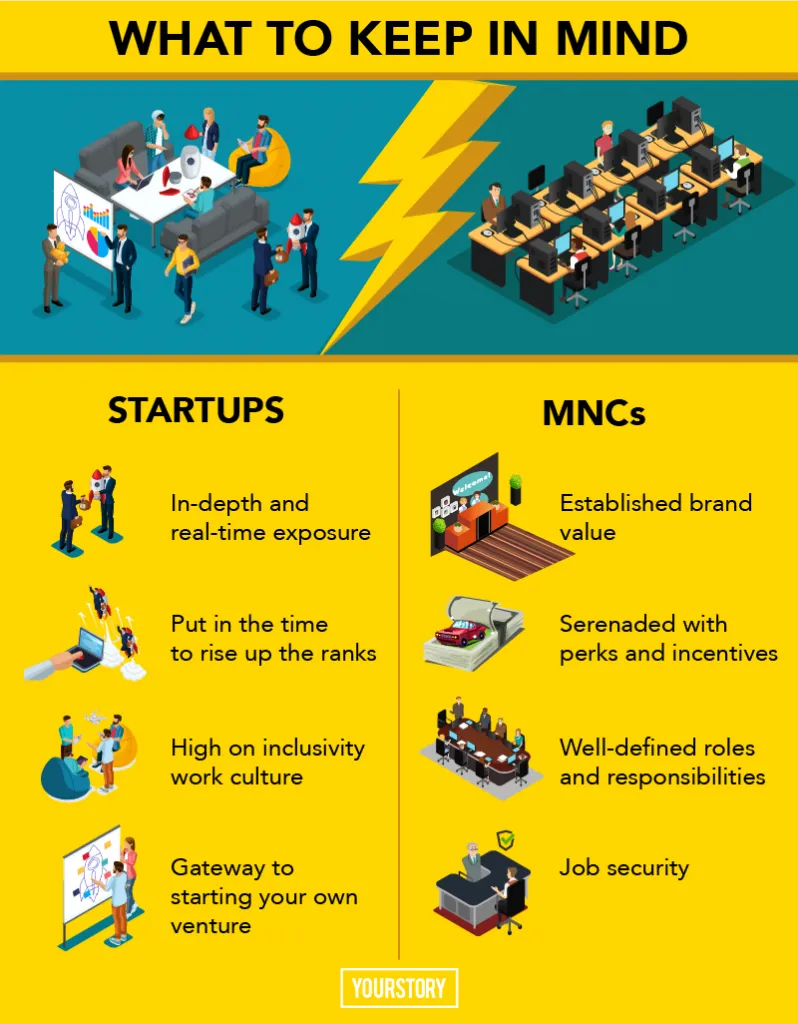MNC vs startup: Deciding on the ‘right pick’ to start your career
As the years of education, the rigours of an extensive course, and the days of college life culminate, focus grows on the big day – campus placement. While working in a big conglomerate remains a dream for most graduates, the likes of Flipkart, Ola, and Paytm have also shown that startups are attractive in more than one way.
Over the last decade, the Indian startup ecosystem has emerged as an attractive career choice. Startups have emerged as worthy competitors to financial muscle flexing corporates when it comes to talent acquisition. With burgeoning funding kitties and operations soaring vertically, startups – both established and fledgeling – have arrived on the Day 1 placement scene at tier-1 colleges. Naturally, this puts them in direct contention with the big players when it comes to talent acquisition.
But even then the proverbial dilemma of the “right pick” still bothers many graduates who bounce between the lucrative offers MNCs have to offer and the possible exposure and growth that they stand to gain at a startup. For that reason, we look at what MNCs and startups have to offer. Hopefully, this will help graduates make an informed decision that will take their career in the right direction.

MNCs and corporates
With years of experience and time-tested procedures in place, multi-national corporates have been the dream placements of many Indian graduates for a very long time. Beyond the lucrative packages, MNCs offer vital industry expertise, a holistic idea of processes, brand value, talent moulding from the ground-up, and above all, job security. We dissect these points further to give you a clearer idea of what you stand to gain at an MNC and if it helps further your career prospects.
Process-driven: One of the key factors helping these behemoths stay on top and grow is their adherence to a process-driven workflow. Often, absolute clarity is offered on your role and the objective you are expected to achieve. This helps especially when you are dealing with clients, tight deadlines, and inter-departmental functions.
This pre-designed structure – built over years of functioning – looks to enshrine a sense of accountability and responsibility, the foundation of a professional life.
Chain of command: An established hierarchical order ensures that there is a chain of command that corporates follow. From people managers to their boss to senior leadership, there is a clear-cut and well-defined path, and you are expected to work within it. Such a system distributes power and authority accordingly, with a view to disseminating information and procedures in an orderly manner from the top ranks to every node working within the system. This process works for people who like to follow a systematic order of things.
Unlimited resources: When working for a multi-national, you can be assured that you will be treated to the best of what the world has to offer. From the latest technology which will facilitate your productivity, to access to industry-leading research data pools, to staying in the best of hotels when on field visits, corporate life can be extremely pampering.
Unmatched incentives and perks: One of the major perks of working for MNCs is the employee benefits you stand to gain. Be it concrete PF plans, maternity leaves, health insurance, bonuses, or loan schemes, etc., corporates are unmatched when it comes to offering perks and incentives. So if you do put in the hours and rise up the ladder, you can likely expect a comfortable life while working, and peace and quiet when you retire.

Startups
Away from the cushy corporate setup and hierarchical rigidity, startups offer a chance to be an effective and all-around contributor. Working for startups can swing towards either end of the spectrum; it can be extremely gratifying while also posing the threat of burnout, and offer a range of emotions and experiences along the way. Take account of these points before you decide to plunge into the high-octane ecosystem.
Dynamism and real-time exposure: Many startups work on the primary principle of being a “constant work-in-progress”. So honeymoon periods are mostly limited to first-day introductions and orientation. Even as a fresh recruit, you are bound to be thrown in the midst of a shark tank and expected to take to the waters as soon as your feet touch it. That is essentially how dynamic and fast-moving the startup ecosystem is.
Such an environment proves to be a testing ground for cognitive skills, independent thinking, and decision making, while also providing for an in-depth approach to understanding and learning the ropes. It will build your appetite to be always-on-the-go and stay abreast of the dynamic nature of the ecosystem.
Something new to learn every day: While working at a startup, professional labels and designations are left behind at the office doorsteps. You might have been hired as a technical officer or code developer or in the administrative branch, but on any given day, you could be asked to liaise with multiple sections and job profiles. For example, coding may be your field of expertise, but you also do have to have a flair for writing. You can leverage both the skills to write sound technology copies and help out the content management team.
This works wonderfully well for versatile professionals who get to sharpen their swords and pick up a thing or two, which can always come in handy. At the same time, it offers a great learning curve where various teams pick up all kinds of skills, irrespective of their “job description”.
Scaling up the ladder: Life at a startup may demand putting in extra hours, missing out on personal time (even family events), and being the frontrunner of not just your team but other processes too. This dizzying high work-rate often effectively trains startup employees for the strains and demands of leadership. A high-octane and adrenaline-filled roller coaster ride, startups have their fair share of thrills and spills. From steady rise on the hierarchical ladder to leaps in salary hikes to ESOP options, startups do have their own way of rewarding the efforts you put in day in and day out.
Take the case of Ambur Iyyappa, who started out as a delivery boy and is now the Associate Director of Customer Experience Management at Flipkart. Iyyappa was the first employee Sachin Bansal and Binny Bansal hired to manage their in-house logistics in 2009. This is only one among many stories.
High on approachability: The USP of startups is all about inclusivity, hence they don’t limit themselves to the rigid framework of hierarchical systems. CEOs and founders work directly with the team, and the only motive is to inch towards the company’s objective. Brainstorming that involves every member of the team, no matter their function, is a common sight in many startups. It allows for an open flow of ideas and working on procedures as a team to ensure the best possible outcome.
Vibrant work culture: The startup culture, as opposed to what cliches paint it to be, is more than just bean bags, open workspaces, and beer pong/foosball challenges, though those are definitely exciting parts of life at a startup. When you have a small group of people putting their hearts and souls into breaking barriers, they naturally develop mutual camaraderie, respect, and trust. In essence, you become a close-knit family unit, and that is the fibre of the startup work culture.
From celebrating birthdays to small victories, to accepting defeat as a team, to overcoming challenges thrust upon them, startup work culture is about being one-for-all and all-for-one.
Leg-up to start your own venture: Having real-time experience in the trenches will always prepare you for your own conquests. When you work at a startup, it pretty much gives you a holistic idea of what the journey encapsulates while also preparing you for your own journey. The experience of dealing with clients, funding rounds, building networks, and keeping tabs on the growth and operational functions will key in a sense of proprietorship and get you battle-ready.
Remember that these are just the ideal scenarios for work environments in startups as well as MNCs. Your actual experience may differ widely based on your circumstances. Nevertheless, these pointers give a good idea of how these organisations and ecosystems function, and you can use them as rudimentary guideposts for what to expect.
Neither startups or MNCs work in isolation from each other – one often influences the other, and vice-versa. There’s plenty that startups can learn from the tried-and-tested policies of corporates, and a lot corporates can pick up from the exuberant and new-age work culture of startups. Neither is likely to offer a tailormade experience to fresh hires; it is up to you to make the most of the situations you face. Keep your mind open, and senses keen, and you’ll learn and grow plenty, irrespective of whether you’re working at a startup or an MNC.







